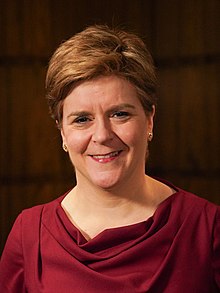
Back Nicola Sturgeon Afrikaans نيكولا ستارجن Arabic نيكولا ستارجن ARZ Nikola Stercen Azerbaijani Nicola Sturgeon BAR Nikola Fergiuson Sterdžėn BAT-SMG Никола Стърджън Bulgarian নিকোলা স্টারজন Bengali/Bangla Nicola Sturgeon Breton Nicola Sturgeon Catalan
Nicola Sturgeon | |||||||||||||||||||||||||
|---|---|---|---|---|---|---|---|---|---|---|---|---|---|---|---|---|---|---|---|---|---|---|---|---|---|
 Sturgeon in 2021 | |||||||||||||||||||||||||
| First Minister of Scotland | |||||||||||||||||||||||||
| In office 20 November 2014 – 28 March 2023 | |||||||||||||||||||||||||
| Monarchs | Elizabeth II Charles III | ||||||||||||||||||||||||
| Deputy | John Swinney | ||||||||||||||||||||||||
| Preceded by | Alex Salmond | ||||||||||||||||||||||||
| Succeeded by | Humza Yousaf | ||||||||||||||||||||||||
| Leader of the Scottish National Party | |||||||||||||||||||||||||
| In office 14 November 2014 – 27 March 2023 | |||||||||||||||||||||||||
| Depute | |||||||||||||||||||||||||
| Preceded by | Alex Salmond | ||||||||||||||||||||||||
| Succeeded by | Humza Yousaf | ||||||||||||||||||||||||
| Deputy First Minister of Scotland | |||||||||||||||||||||||||
| In office 17 May 2007 – 20 November 2014 | |||||||||||||||||||||||||
| First Minister | Alex Salmond | ||||||||||||||||||||||||
| Preceded by | Nicol Stephen | ||||||||||||||||||||||||
| Succeeded by | John Swinney | ||||||||||||||||||||||||
| Depute Leader of the Scottish National Party | |||||||||||||||||||||||||
| In office 3 September 2004 – 14 November 2014 | |||||||||||||||||||||||||
| Leader | Alex Salmond | ||||||||||||||||||||||||
| Preceded by | Roseanna Cunningham | ||||||||||||||||||||||||
| Succeeded by | Stewart Hosie | ||||||||||||||||||||||||
| |||||||||||||||||||||||||
| |||||||||||||||||||||||||
| Personal details | |||||||||||||||||||||||||
| Born | Nicola Ferguson Sturgeon 19 July 1970 Irvine, Ayrshire, Scotland | ||||||||||||||||||||||||
| Political party | Scottish National Party | ||||||||||||||||||||||||
| Spouse | |||||||||||||||||||||||||
| Parents |
| ||||||||||||||||||||||||
| Alma mater | University of Glasgow | ||||||||||||||||||||||||
| Cabinet | |||||||||||||||||||||||||
| Signature | |||||||||||||||||||||||||
| Website | Parliament website | ||||||||||||||||||||||||
| ||
|---|---|---|
|
Deputy First Minister of Scotland (2004–2014)
First Minister of Scotland (2014–2023)
|
||
Nicola Ferguson Sturgeon (born 19 July 1970) is a Scottish politician who served as First Minister of Scotland and Leader of the Scottish National Party (SNP) from 2014 to 2023.[1][2] She has served as a member of the Scottish Parliament (MSP) since 1999, first as an additional member for the Glasgow electoral region, and as the member for Glasgow Southside (formerly Glasgow Govan) from 2007.
Born in Ayrshire, Sturgeon is a law graduate of the University of Glasgow. She worked as a solicitor in Glasgow before her election to the Scottish Parliament in 1999. She served successively as the SNP's shadow minister for education, health, and justice. Sturgeon entered the leadership of the SNP but later withdrew from the contest in favour of Alex Salmond, standing instead as depute leader on a joint ticket with Salmond. Both were subsequently elected; as Salmond was still an MP, Sturgeon led the SNP in the Scottish Parliament as Leader of the Opposition from 2004 to 2007. The SNP emerged as the largest party following the 2007 election and Salmond headed the first SNP minority government, with Sturgeon as his deputy. From 2007 to 2012, she served as health secretary, overseeing the scrapping of prescription charges and the 2009 swine flu pandemic. Following the SNP's landslide majority in 2011, she was appointed Cabinet Secretary for Infrastructure, Capital Investment and Cities, which saw her in charge of the legislative process for the 2014 Scottish independence referendum. The defeat of the Yes Scotland campaign resulted in Salmond's resignation as SNP leader.
Sturgeon was elected unopposed as SNP leader in November 2014 and was subsequently appointed as first minister, becoming the first woman to hold either position.[3][4] She entered office amid a rapid surge in membership of the SNP, which was reflected in the party's performance in the 2015 general election, winning 56 of the 59 Scottish seats and replacing the Liberal Democrats as the third-largest party in the House of Commons. The SNP continued to enjoy electoral successes throughout Sturgeon's nine years in office, but lost 21 seats in the 2017 general election. Despite losing her majority, Sturgeon secured a second term in office in 2016, forming a minority government.
Sturgeon led the Scottish Government's response to the COVID-19 pandemic, implementing a series of restrictions on social gatherings and the rollout of the vaccine programme. A seat short of a majority in 2021, Sturgeon became the only first minister to serve a third term, and she subsequently entered a power-sharing agreement with the Scottish Greens. The calls from Sturgeon's government and the wider independence movement for a second referendum were unsuccessful, as successive Conservative prime ministers refused to grant a Section 30 order. From 2022, Sturgeon received heavier criticism for her positions on gender reforms. On 15 February 2023, Sturgeon resigned the leadership of the SNP claiming occupational burnout; she was succeeded by her health secretary, Humza Yousaf, the following month.
- ^ "Nicola Sturgeon: the First Female and Now Longest Serving First Minister". Bloomberg.com. 24 May 2022. Archived from the original on 4 October 2022. Retrieved 10 March 2023.
- ^ Specia, Megan (15 February 2023). "Nicola Sturgeon Is Scotland's Longest-Serving First Minister". The New York Times. ISSN 0362-4331. Archived from the original on 19 March 2023. Retrieved 10 March 2023.
- ^ Brooks, Libby (19 September 2014). "Alex Salmond's resignation could give Nicola Sturgeon her day of destiny". The Guardian. London. Archived from the original on 9 December 2014. Retrieved 19 November 2014.
- ^ Campbell, Glenn (13 November 2014). "The transition from Alex Salmond to Nicola Sturgeon". BBC News. Archived from the original on 17 November 2014. Retrieved 19 November 2014.


